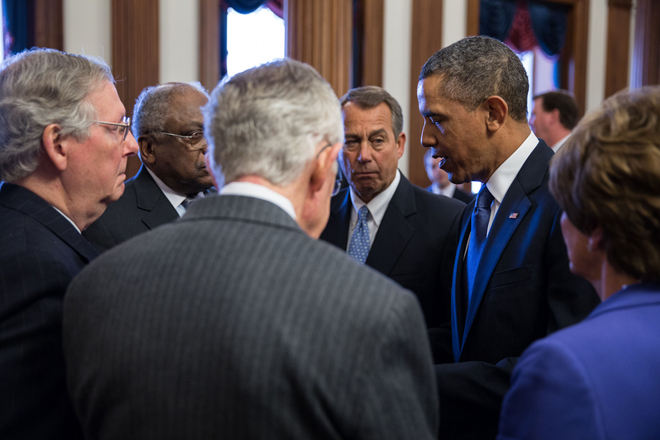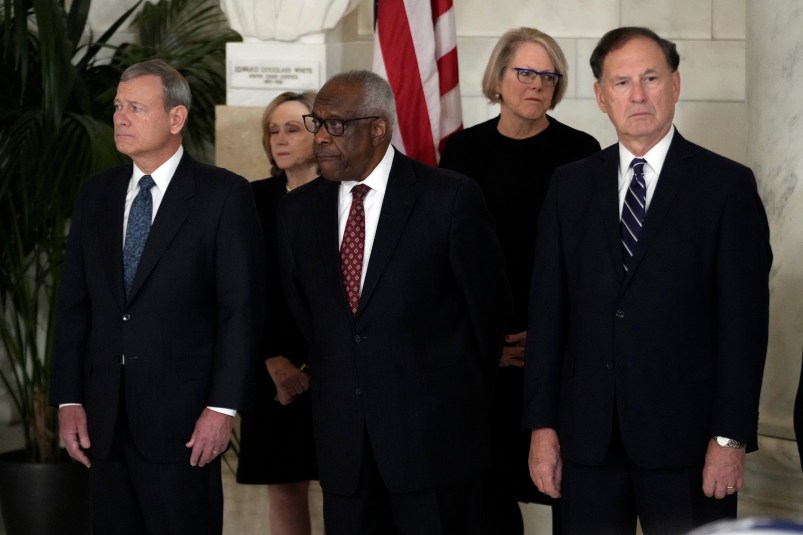No sense in denying it. Politico won the primetime last night with a breathtaking story about Congressional hypocrisy. The article’s here. The nub of it is that Democrats and Republicans are supposedly, and secretly, trying to exempt lawmakers and their aides from Obamacare. Back in 2009, when the bill was in its infancy, Sen. Chuck Grassley (R-IA) introduced an amendment to effectively require members and staffs to obtain their insurance on the exchanges just like your average Joe whose employer doesn’t provide health benefits. It passed, for reasons which should be politically obvious. Now members want a mulligan.
Ezra Klein burrows into the specifics and lets these supposedly scheming members of Congress off the hook. All that’s happening, he reports, is that members are trying to figure out a way for Congress to continue contributing to employee premiums.
We’re still burrowing down into the specifics ourselves, because we want to give everyone a completely fair shake, without lapsing into credulity. But at first glance, and then after some initial reporting, I think the truth is somewhere in between.
Congressional leaders don’t appear to be trying to repeal the Grassley amendment. As Ezra writes, they’re investigating whether there’s a way for the federal government, which employs Congressional aides, to continue helping folks on the Hill afford insurance.
But that in and of itself violates the spirit, if not the letter, of Grassley’s amendment.
As he explained in a 2009 statement, “The exchange that would be established by [Obamacare] is…designed to give participants the same kind of choices and options for health care coverage as federal employees. It would allow individuals who don’t receive insurance from employers to purchase policies at group rates. My interest in having Members of Congress participate in the exchange is consistent with my long-held view that Congress should live under the same laws it passes for the rest of the country.”
The idea was to put members and their aides in the same legal and economic situation as individuals. Require them to comply with the mandate. If they qualify for subsidies, great; If not — as many will not — that’s on them.
And it’d be on a lot of them. Subsidies kick in for individuals at 100 percent of the federal poverty level and decrease on a sliding scale until they zero out at 400 percent of FPL — which in 2009 was $43,320 for an individual or $88,200 for a family of four.
By seeking a way for the federal government to continue contributing to staffer and member premiums, they’re effectively looking to provide themselves and their aides with a subsidy that individuals in the rest of the country, whose employers don’t provide them health benefits, will not get.
That’s not exempting them from Obamacare, per se. But it’s definitely special treatment.
Now, as Ezra notes, the law does contain a provision that will allow employers to offer their employees exchange-based insurance alongside group plans starting in 2017. The infrastructure and authority won’t exist yet for the federal government to do that in 2014 — and aides on Capitol Hill insist that they’re simply trying to square that circle.
But that benefit is three years off — why should Congressional aides get it early? — and it’s sort of beside the point anyhow. The purpose of the Grassley amendment wasn’t to provide members and aides a plethora of new insurance options, while continuing to enjoy a de facto subsidy from their employer. It was first and foremost an attempt to embarrass Democrats by putting them on the record: If this Obamacare thing is so great, why don’t you consign yourselves to it.
Well, they did.
But it was also to make them experience the law — the good and the bad — just like everyone else who’ll be forced on to the exchanges. And it does seem like some Congressional leaders are looking for a way to soften the law’s economic impact on staffers (and maybe themselves) in a way that its millions of other beneficiaries will have to live without.
Update: I should note that since the federal government will be saving money on Congressional compensation under the Grassley amendment, it in theory could redirect those savings into higher employee salaries — which would of course help those employees afford insurance on the exchanges. In practice, I don’t know if that’s something Congress can do quite so straightforwardly.







